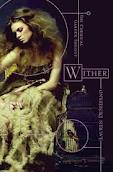Wither by Lauren DeStefano
4 stars
“Thanks to modern science, every newborn has become a ticking genetic time bomb—males only live to age twenty-five, and females only live to age twenty. In this bleak landscape, young girls are kidnapped and forced into polygamous marriages to keep the population from dying out.
When sixteen-year-old Rhine Ellery is taken by the Gatherers to become a bride, she enters a world of wealth and privilege. Despite her husband Linden’s genuine love for her, and a tenuous trust among her sister wives, Rhine has one purpose: to escape—to find her twin brother and go home.
But Rhine has more to contend with than losing her freedom. Linden’s eccentric father is bent on finding the antidote to the genetic virus that is getting closer to taking his son, even if it means collecting corpses in order to test his experiments. With the help of Gabriel, a servant she is growing dangerously attracted to, Rhine attempts to break free, in the limited time she has left.”
Yes, another dystopian! What can I say? This stuff is in vogue right now and there’s only so much I can see or hear about a book before I snatch it off the shelves and go FINE ALRIGHT ALREADY. (It was also on sale, so that helped too.) I had researched this book on Goodreads once again, and found that several friends whose opinions I trust had loved this book, but some others had also disliked it. Once again, I came at it with lower expectations.
I must say that I was pleasantly surprised. Despite DeStefano’s world seeming to be even less of a believable concept than that of Ally Condie’s Matched (whose world building issues were discussed at length here), I believed in it—which I hadn’t believed I would. How could anyone make both extremely short life spans and polygamous marriages work, right? Apparently, DeStefano—very well, I might add. But onto that in a minute…
Let’s get what I didn’t like out of the way first, shall we? There were two things that really got to me: 1) Rhine and Gabriel and 2) the “tempo” of the plot. The relationship between Rhine and Gabriel might have been more of an issue with my personal taste, but it just felt forced. First they’re friends and then they’re kissing and then they’re friends and then they’ve got their hands on each other and then they’re friends again. I was honestly quite baffled by their relationship. It felt like a sincere friendship, but the story seemed to be trying to force it into something more. Clearly these two have a relationship coming in the next book, but I would have preferred to see them as just honest friends in Wither (which was done well in the spots where they were just friends).
The tempo of the plot was a much bigger issue, though there’s really less to say on it. There was certainly things happening and I could barely stop reading, but the book never affected by heart rate if you know what I mean. There were certainly points where the plot got to me, but they were more flashes than anything else.
But you can bet your life I’ll be reading the second book in this trilogy, titled Fever and expected February 21, 2012. Why? Because of everything DeStefano did right, and her way with words. Perhaps her way with words is one reason the plot never got to my heart rate—sometimes short and succinct are better and more gripping, aspiring writers!—but I refuse to put too much blame there because she has a way with words. Descriptions, analogies, etc—I wanted to write them down and steal them.
Also, polygamy. No matter your feelings on the subject, that’s a tough thing to write about. DeStefano never blinks. You’re never given the feeling that the marriages are right, but they never feel contrived either. How she managed to make polygamy feel like a societal convention but wrong at the same time is beyond me and I like it.
All and all, I think dystopian fans should definitely give Wither a shot. Unlike Matched, which was very romance oriented, Wither felt much deeper and plot oriented, with just enough romance to keep romance lovers happy but not turn off people who think YA romance should be burnt. Relationships in the book—such as the friendship between Rhine and Gabriel and the camaraderie between the sister wives—are excellently written and feel decidedly real. It hints at moral questions but doesn’t get preachy. In a nutshell, I found Wither to be a fine addition to the dystopian titles exploding off the shelves right now. If you enjoyed Divergent by Veronica Roth and/or Matched, I totally recommend that you give it a shot.

6 thoughts on “Review: Wither by Lauren DeStefano”